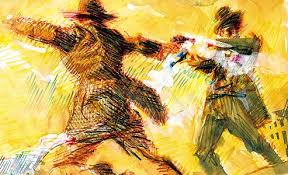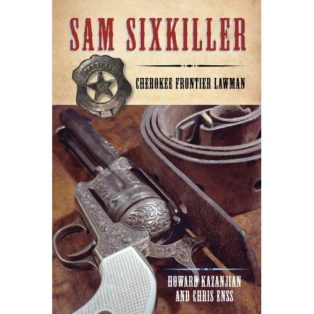Enter now to win a copy of
Sam Sixkiller: Cherokee Frontier Lawman

Sheriff John Culp and Constable Rush Meadows of Chick County, Texas, raced their foam-flecked horses into a dense stand of trees leading to the Arbuckle Mountains, several miles north of Muskogee. The seasoned riders guided their mounts around centuries-old pines and oaks, twisted with age, and massive boulders keeping company with the crowded forest.
The lawmen were in pursuit of the outlaw Dick Glass. Glass rode hard, maneuvering his horse in and out of downed timbers. An insane rage possessed him—he could not allow himself to be caught. He dug his heels into his ride and steered the animal toward an embankment. A wind that seemed to blow from the outer spaces of eternity swept his hat off. He didn’t even glance after it.
The one thousand dollar reward for Glass’s capture, offered by the US Western District Federal Court, spurred the officers on. Glass was a Creek Freedman—half Indian, half black—and a one-time farmer in the Creek Nation. When the Civil War ended in 1865, all the slaves belonging to Indians became free and equal. Generations of Creek Freedmen had been raised on the land they worked, and they wanted part of it for their own once the battle between the states had concluded. Not only was their request denied, but also they were dispossessed because they weren’t Indian. Men like Dick Glass were bitter over the unjust treatment and many turned to a life of crime and retaliation.
In late March 1885 Glass and the gang of miscreants that usually rode with him were run out of the Creek Nation for rustling cattle, stealing horses, and murdering. He reluctantly obliged, taking with him other Creek Freedmen who had partnered with him in his lawless activities.
Glass roamed through the Seminole, Pottawatomie, and Chickasaw Nations to the Texas line before settling a spot seven miles from Muskogee known as the Point. Glass and his gang made their way back to the Point after every criminal act. It was their rendezvous location, and lawmen who came looking and found him there never lived long enough to report it. There were no cabins, lean-tos, or barns on the property. Glass and the other desperados slept outdoors, exposed to the elements.

To learn more about the courageous lawman Sam Sixkiller read
Sam Sixkiller: Cherokee Frontier Lawman

